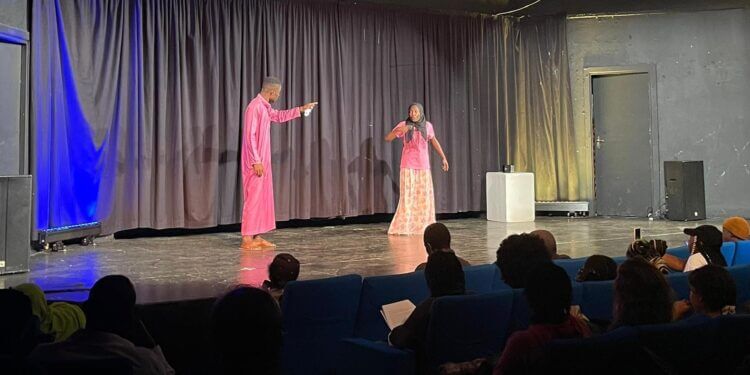Brazilian playwright Augusto Boal is known for having popularised theatre of the oppressed, a type of theatre that critically highlights issues affecting a community and gives the target audience a chance at coming up with concrete actions to address these problems.
Watatu is an interactive play set at the Kenyan coast, and tells the story of Yusuf (Said Muhsin), a young Muslim who turns into extremism after frustrations stemming from injustices and lack of job opportunities. The play opened at the Alliance Française in Nairobi, marking its inaugural tour in the city.
Watching Watatu reminded me of the major issues that I have seen highlighted in the Kenyan mainstream media, and some that I have heard in the streets, the major one being the popular radical movement “Pwani Si Kenya”, calling for secession of the Kenyan coast from the rest of the county. This movement came into existence in the late 2010s in Mombasa citing government’s oppression against their communities, leaving them in a state of joblessness, high illiteracy levels, and poverty.
Watatu is an adaption of the Kenyan film of the same name, and which is currently on Netflix. The main issues that the play highlight include youth radicalisation, religious extremism, xenophobia, economic disparity, corruption, politics, and culture.
The most brilliant choice that Watatu makes is its active involvement with the audience from beginning to end. In the opening scene, one of the lead characters, Salim (Ali Mlatso), and his wife Khadija (Khadija Abdulqadir), enter the stage from the auditorium. The duo then starts singing a Taarab hit song, Nakupenda Kama Sukari, as a celebration of their love, and Kadija’s birthday.The audience join in the singing while the husband and wife dance together. The story then starts unfurling and gets to the core of the issues. We are introduced to Jack (George Kituto), a police officer from bara (non-coastal Kenya) who has been recently posted at the new station in Mombassa. We also encounter Yusuf, a recent university graduate whose unfruitful search for a job makes easy prey for a Somalia-based militia group who want to use him to launch a bomb attack against a group of the Christian faithful at a local church.
The fact that Watatu takes the form of forum theatre, it’s excusable that they didn’t include several conventional theatrical production elements. For instance, there is no elaborate set design. Watatu‘s world is characterised by a blank stage, with black curtain as its backdrop. On the stage, there’s only a small black radio cassette which stays silent for almost three-quarters of the play. We only hear sounds from it when a bombing attack happens at the church and the the announcer (Neema Sulubu) breaks the news to the public.
There is no detailed lighting design, and the focus is just to illuminate the characters so that the audience can see and interact with them. However, there is a dominant blue that lights most of the scenes, and yet its meaning is lost on me, as it’s present in both happy and somber scenes. Again, a characteristic of forum theatre is to have minimal production elements to enable its malleability. Hence, Watatu could be performed in the streets, at the beach, in the theatres or anywhere else, as long as there’s space, the audience, and the actors.
Before the play began, the director Ali Mlatso prepared the audience for what was to come by explaining the context of the play and the issues it addresses, including its forum nature. Ali also informed the audience that the play would run twice. The first time would be a complete run without the audience interruption. During the first run, the audience was encouraged to watch keenly at the unfolding events, and take notes on the way the issues are tackled, then think of the aspects of the play that they would change to articulate the issues more clearly.
The play would then run for the second time, and audience members would be given a chance to rise off their seats and shout “stop” in a particular scene then give directions on how to enact the scenes better and communicate the contentious issues clearer. This is my highlight of Watatu – watching the whole auditorium turn into an audience of directors. It was beautiful to see the community members give solutions to their problems in a play setting.
Watatu should definitely have more tours around the country, since the issues presented affect the whole country and the production team has proven the importance of using theatre as a tool to amplify our societal challenges and tackle hard dialogues from an artistic perspective.
Enjoyed this article?
To receive the latest updates from Sinema Focus directly to your inbox, subscribe now.











